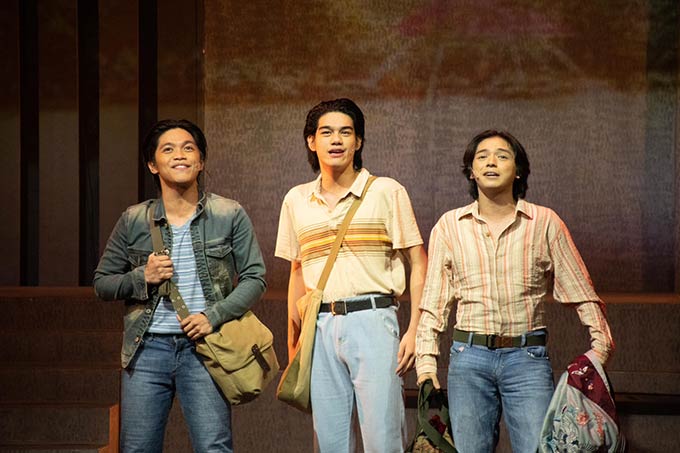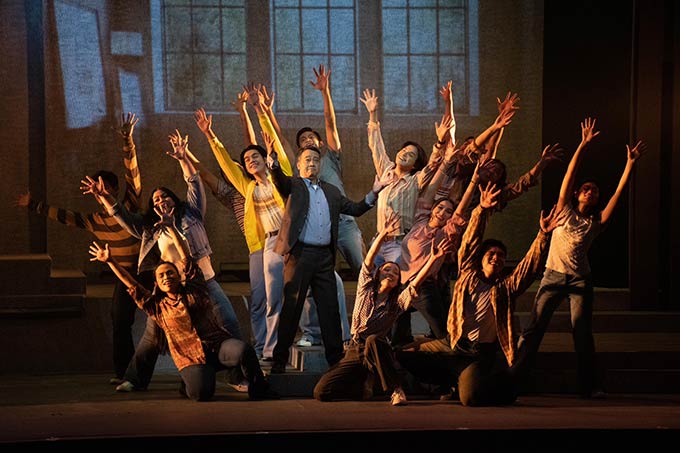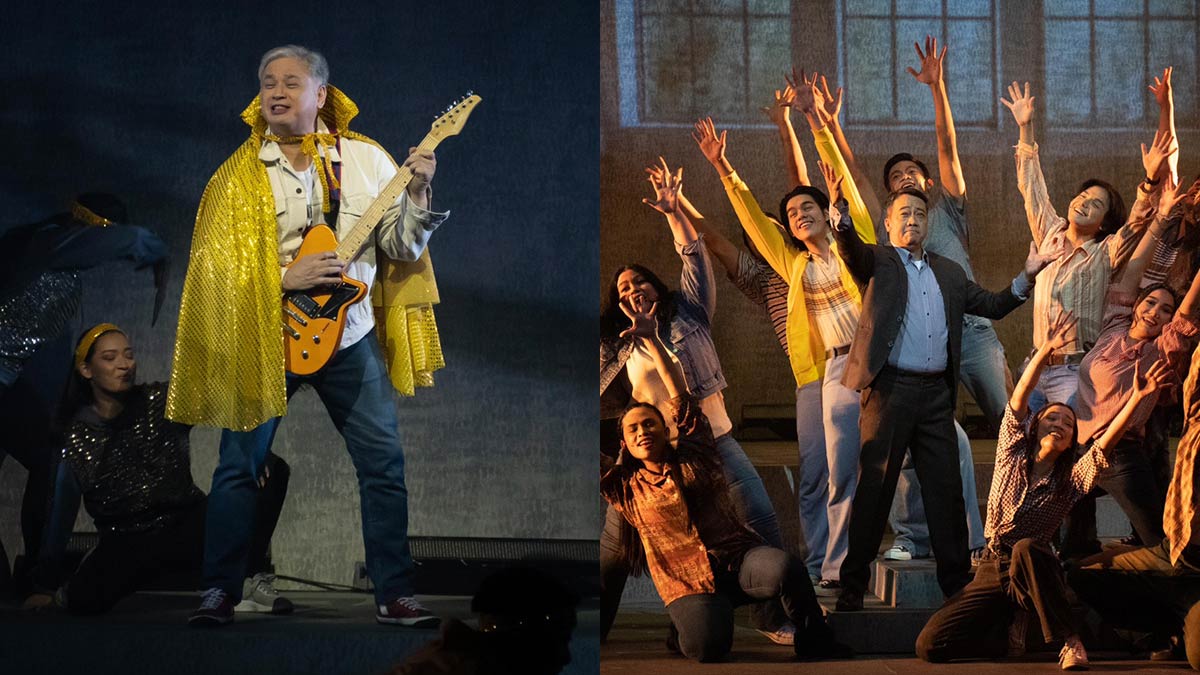Something beautiful is happening in the country. The oftentimes lonely battle against disinformation and historical distortion is gaining ground—with small but nonetheless encouraging victories via the performing arts.
Playing to enthusiastic audiences and entering its second and last weekend run at the Carlos P. Romulo Auditorium of RCBC Plaza in Makati is Silver Lining, a new original Filipino stage musical about three friends preparing for their 50th anniversary high school homecoming and resolving painful conflicts from the past.
The school’s name is never revealed although it becomes apparent, through the quick-paced dialogue mentioning Ortigas Avenue as a grassy field back in the day, that it’s La Salle Green Hills (LSGH).
The setting is a few years before martial law, the date of which is September 21, 1972.
The reference to LSGH is key to understanding the context from which the play takes off.
Ricky Davao is Leo, the rock ‘n’ roll fanatic fronting the school band he formed to play at the homecoming with batchmates Joel Núñez as Anton and Raúl Montesa as Raúl.

Nena Arcayan is Anton’s wife, Josie.
When Raúl announces the band’s performance will be limited to just three numbers, Leo is aghast. No way, Leo insists. The group has been rehearsing for over a year with songs he himself wrote for the anticipated event.
But wait, Leo adds, why not stage a full-blown musical with a full cast instead? What follows are auditions for the characters that will shape the story of Silver Linings via crucial flashbacks coming in between the present time.
The characters’ backstories capture the quirks of Filipino youth who come of age as the 1970s begin. The young Anton (Noel Comía) appears always with a joint in hand—weed as a symbol of defiance against straight society while enjoying its recreational high.
The teenaged Josie (Sara Sicam) channels women’s liberation by wooing the dashing Leo, but the latter is smitten with the beauteous Julia (Kristal Brimner).
The girls are referred to as “colegialas,” which means they come from exclusive girls schools: St. Theresa’s, Assumption, Maryknoll (before it became Míriam), and Teresiana (now Poveda).
Other notable personas include the campus guitarist Chito (Khalil Tambio); the ensemble composed of Sarah Facuri, Iya Villanueva, Dippy Arceo, Rodel Pingol, Ado Villanueva, and Joshua Tayco; and Leo’s outspoken daughter Dalai (Maronne Cruz) from a failed marriage.
CONTINUE READING BELOW ↓

Read: Ricky Davao, bakit binabalik-balikan ang teatro kahit maraming proyekto sa TV at pelikula?
MORE THAN JUST A LOVE STORY
The lighthearted reminiscing—punctuated by easygoing pop tunes in the style of the Apo Hiking Society—takes a somber tone as images of student protests worldwide are flashed on the backdrop screen, followed by then-President Ferdinand E. Marcos’s much-used TV appearance announcing he is “placing the entire Philippines under martial law.”
With martial law, Marcos’s name gets stuck with the word dictator.
At this point, Silver Lining does not hide its contempt of dictators and proceeds to recall the First Quarter Storm (January to March of 1971), even as it shows candor in portraying La Salle boys, by now in college at UP Diliman, as joining rallies and organizations just to get close to colegialas-turned-activists.
Leo falls hard for Julia beyond her looks, admiring her artistic talents and commitment to the cause of the “movement.”
Leo’s writing of the musical encounters a serious problem because he can’t get over losing Julia. To complicate matters, Raul keeps meddling and cutting parts of the script, which leads everyone to question his motives.
This becomes the crux of the matter, the main conflict: what really happened to Julia who was last seen in the company of comrades Raúl and Agnes (Hazel Maranan)?

A CLASH BETWEEN PRINCIPLES AND PRAGMATISM
As it turns out, Julia sacrifices her life to let Raul and Agnes escape from a military checkpoint.
The confrontation scenes between Leo and Raul demonstrate the clash between principles and pragmatism, or why many activists totally went underground while the rest chose to lead safe, comfortable lives.
However, what makes Silver Lining appealing to a wider audience is that it’s not just about boomers coming to terms with their complicated, painful past, it is also about Gen Z members amplifying their collective voice.
This is highlighted in the hip-hop number, “Huwag Baguhin ang Kuwento,” which encapsulates the youth’s pushback against fake news and blind allegiance.

Thus, Silver Lining is no longer the story of La Salle’s hippie-activist generation caught up in nostalgia, but about an entire nation documenting its turbulent distant, as well as recent, past.
Congratulations are in order to the show’s creators: Jack Teótico (music and lyrics), Joshua Lim So (book and lyrics), Vince Lim (musical direction, arrangement, additional music), and Maribel Legarda (direction).

Ricky Davao can still hack it in the song-and-dance numbers (he was, after all, once a member of the Vicor Dancers). Great to see Repertory Philippines alumnus Joel Nuñez back on stage. And Raúl Montesa is effective as a cunning, bad guy.
A takeaway food for thought: To find the truth, keep digging.
Silver Lining is on its last run on October 27-29. Visit Ticket2Me.net.
Read: Alexa Ilacad, KD Estrada deliver kilig as Julia and Tenyong in Walang Aray
REVIEW BY POCHOLO CONCEPCION
The PEP REVIEW section carries the views of individual reviewers, and does not necessarily reflect the views of the PEP editorial team.


